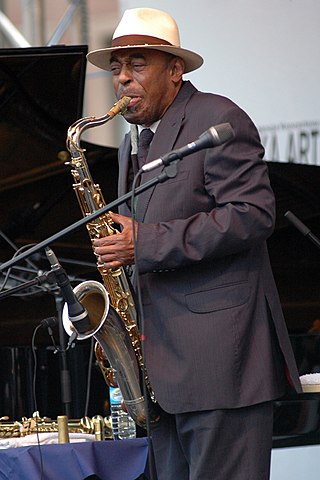
Archie Shepp is an American jazz saxophonist, educator and playwright who since the 1960s has played a central part in the development of avant-garde jazz.

John Martin Tchicai was a Danish free jazz saxophonist and composer.
Rufus is a masculine given name and a surname.
The New York Art Quartet was a free jazz ensemble, originally made up of saxophonist John Tchicai, trombonist Roswell Rudd, drummer Milford Graves and bassist Lewis Worrell, that came into existence in 1964 in New York City. Worrell was later replaced by various other bassists, including Reggie Workman, Finn Von Eyben, Harold Dodson, Eddie Gómez, Steve Swallow, and Buell Neidlinger. All About Jazz reviewer Clifford Allen wrote that the group "cut some of the most powerful music in the free jazz underground".

Ascension is a jazz album by John Coltrane recorded in June 1965 and released in 1966. It is considered a watershed in Coltrane's work, with the albums recorded before it being more conventional in structure and the albums recorded after it being looser, free jazz inspired works. In addition, it signaled Coltrane's interest in moving away from the quartet format. AllMusic called it "the single recording that placed John Coltrane firmly into the avant-garde".
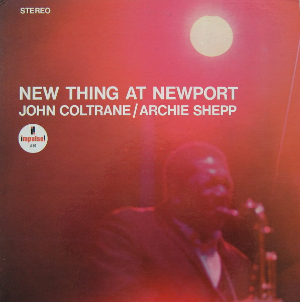
New Thing at Newport is a 1965 live album featuring two separate sets from that year's Newport Jazz Festival by tenor saxophonists John Coltrane and Archie Shepp. It was recorded four days after the recording session for Coltrane's album Ascension, on which Shepp appeared, and is one of several albums documenting the end stages of Coltrane's "classic quartet," which would begin to break up by the end of that year with the departure of McCoy Tyner.

Fire Music is a studio album by jazz saxophonist Archie Shepp released on Impulse! Records in 1965. "Malcolm, Malcolm Semper Malcolm" is dedicated to Malcolm X, whilst "Los Olvidados" is a homage to the 1950 film of the same name. Featured musicians include trumpeter Ted Curson, trombonist Joe Orange, alto saxophonist Marion Brown, bassist Reggie Johnson and drummer Joe Chambers.
J.C. Moses was an American jazz drummer.
The New York Contemporary Five was an avant-garde jazz ensemble active from the summer of 1963 to the spring of 1964. It has been described as "a particularly noteworthy group during its year of existence -- a pioneering avant-garde combo" and "a group which, despite its... short lease on life, has considerable historical significance." Author Bill Shoemaker wrote that the NYCF was "one of the more consequential ensembles of the early 1960s." John Garratt described them as "a meteor that streaked by too fast."

Four for Trane is a studio album by tenor saxophonist Archie Shepp released on Impulse! Records in 1965. Four of the five tracks were composed and originally recorded by John Coltrane and rearranged by Shepp and trombonist Roswell Rudd. The other featured players are trumpeter Alan Shorter, alto saxophonist John Tchicai, bassist Reggie Workman and drummer Charles Moffett. Coltrane himself co-produced the album alongside Bob Thiele. The album was Shepp's first release for Impulse!
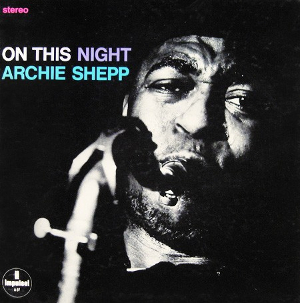
On This Night is an album by Archie Shepp released on Impulse! Records in 1965. The album contains tracks recorded by Shepp, bassist David Izenzon and drummer J. C. Moses in March 1965 and with a larger band in August of that year that included vibraphonist Bobby Hutcherson, bassist Henry Grimes and percussionists Ed Blackwell, Joe Chambers and Rashied Ali.

Archie Shepp – Bill Dixon Quartet is the debut album by saxophonist Archie Shepp and trumpeter Bill Dixon released on the Savoy label in 1962. The album features three performances by Shepp & Dixon with Don Moore and Paul Cohen and a version of Ornette Coleman's composition "Peace" with Reggie Workman and Howard McRae. The album was also rereleased in 1970 as Peace on the French BYG label, flipping the running order on side two, and on CD in 2010 as a "unauthorized European" edition on the Free Factory label, using the Savoy title but the BYG running order.

Consequences is the debut album by the New York Contemporary Five featuring saxophonists Archie Shepp and John Tchicai, trumpeter Don Cherry, bassist Don Moore and drummer J. C. Moses. The album was released on the Fontana label in 1966. In 2020, the Ezz-thetics label re-released the material from Consequences, along with the three NYCF tracks from the B side of Bill Dixon 7-tette/Archie Shepp and the New York Contemporary 5, on a remastered compilation CD titled Consequences Revisited.

Archie Shepp & the New York Contemporary Five is a live album by the New York Contemporary Five recorded at the Jazzhus Montmartre in Copenhagen, Denmark, on November 15, 1963, and featuring saxophonists Archie Shepp and John Tchicai, trumpeter Don Cherry, bassist Don Moore and drummer J. C. Moses. The album was originally released on the Sonet label in 1964 as New York Contemporary 5 in two separate volumes on LP and later as an edited concert on a single CD, removing the track "Cisum."

Bill Dixon 7-tette/Archie Shepp and the New York Contemporary 5 is an album released on the Savoy label originally featuring one LP side by Bill Dixon's septet and one LP side by the New York Contemporary Five featuring saxophonist Archie Shepp. The album resulted from Dixon and Shepp's contractual obligations to provide Savoy Records with a second album after the Archie Shepp - Bill Dixon Quartet (1962) but following a professional separation.
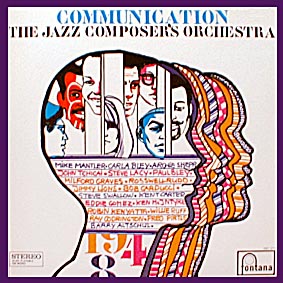
Communication is the debut album by the Jazz Composer's Orchestra featuring compositions by Michael Mantler and Carla Bley performed by Paul Bley, Steve Lacy, Jimmy Lyons, Roswell Rudd, Archie Shepp, John Tchicai, Fred Pirtle, Willie Ruff, Ken McIntyre, Robin Kenyatta, Bob Carducci, Kent Carter, Steve Swallow, Milford Graves, and Barry Altschul. The album was released on the Fontana label in 1965. AllMusic described it as "one of the masterpieces of creative music in the '60s".
Lewis Worrell is a jazz double bassist best known for his work during the 1960s with Albert Ayler, the New York Art Quartet, Roswell Rudd, and Archie Shepp.
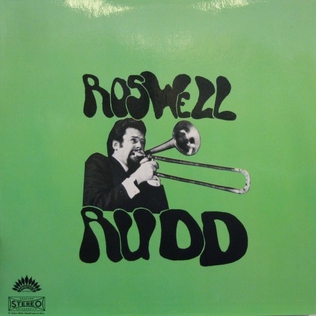
Roswell Rudd is a live album by the trombonist Roswell Rudd, the first recording under his name. It was recorded in November 1965 in Hilversum, Netherlands, and was released by America Records in 1971. On the album, Rudd is joined by saxophonist John Tchicai, bassist Finn Von Eyben, and drummer Louis Moholo.

Call It Art is an album by the New York Art Quartet. It contains previously unissued live and studio tracks recorded in 1964 and 1965, and was released in limited quantities as a five-LP box set by Triple Point Records in 2013. The album includes a 156-page clothbound book containing liner notes by Ben Young, photos, reproductions of manuscripts, and a complete history and itinerary of the group, housed in a custom wooden box. Musicians featured on the album are saxophonist John Tchicai, trombonist Roswell Rudd, bassists Bob Cunningham, Don Moore, Eddie Gómez, Lewis Worrell, and Reggie Workman, and drummers J. C. Moses and Milford Graves. Trumpeter Alan Shorter appears on several tracks, and Amiri Baraka also makes a guest appearance.

Four Days in December was a four-day festival of new jazz music that took place at Judson Hall in New York City. Sponsored by the Jazz Composers Guild, it occurred from December 28–31, 1964, and was the group's most visible event. Along with the October Revolution in Jazz, held two months prior and organized by Bill Dixon, it led to a sense of optimism regarding the possibility of producing concerts via non-traditional means.














